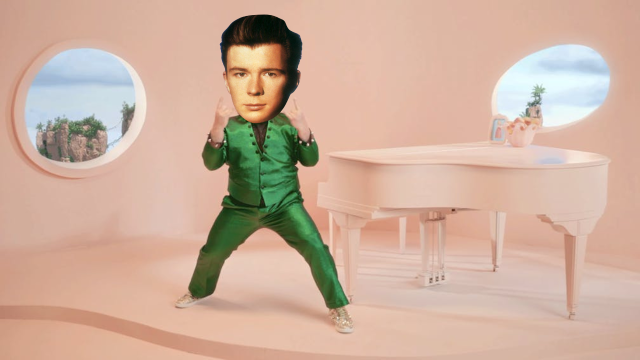The Super Mario Bros. Movie has been busy the last few weeks making headlines for its bountiful video game easter eggs, making box office records, and making Bowser stans the world over feel validated thanks to actor Jack Black’s show-stopping performance both on and off the silver screen. Now movie-goers think Black may have secretly rickrolled them with Bowser’s love ballad, “Peaches.”
Prior to the movie’s release, Black uploaded a selfie on Instagram that offered a glimpse at sheet music titled “Peaches,” which sent fans into frenzied speculation. It turned out that not only did Black perform the song during the film, but he reprised it during one of the Super Mario Bros. Movie’s two end — credit scenes. Keeping their fingers on the pulse, Nintendo and Illumination capitalised on the post-credit version’s viral popularity by posting a music video of this second version of “Peaches” on YouTube just two days after the movie’s release.
Read More: Video Games Are Dominating TV And Film Right Now
Now, the catchy melody and its live-action music video directed by Cole Bennett have collectively garnered over 24 million views. Now that the tune has effectively replaced “We Don’t Talk About Bruno” from Disney’s 2021 film Encanto as the new animated earworm song, fans believe Black might have discreetly rickrolled the world by hiding Rick Astley’s chord progression in Bowser’s love song.
Bowser’s sorrow is stored in the piano chords
Three days ago, YouTube musician Chris Cornell uploaded a video called “Peaches by Jack Black is Unironically Really Good” where he broke down how Black injected his comedic chops and penchant for singing into Nintendo’s fire-breathing Koopa king ditty. For music nerds, Cornell revealed that “Peaches” is in the key of D-flat minor, a key most commonly used in popular sorrowful love ballads like Dolly Parton’s “Jolyne,” Britney Spears’ “Oops!…I Did It Again,” and The Beatles’ “All My Loving.” Once viewers were made aware of this fanciful musical fact, they quickly began theorizing that Black’s Oscar-eligible performance was a subtle rickroll because his song’s piano chords sounded suspiciously similar to Rick Astley’s 1987 pop hit and late-aughts internet meme “Never Gonna Give You Up.”
“If they used the Rickroll progression on PURPOSE then this gets even more legendary than [it] already is,” a YouTube commenter wrote.
“That chord progression is phenomenal, it really just tells you that Bowser’s never gonna give her up,” wrote another.
“Leave it to Jack Black to rickroll the whole world,” wrote said someone on TikTok.
Kotaku reached out to Black’s publicist for comment.
Mayhaps the ‘Peaches’ song isn’t that deep
While many fans are dead-set on believing that the piano chords of “Peaches” are a deep-cut rickrolling musical reference, other Mario fans think it’s either just the “Star Theme” song drastically slowed down or that the “Peaches’” musical lore just isn’t that deep. My money is on Black simply implementing Japan’s “Royal Road” chord progression in his raucous melody. Royal Road progression is a typical chord progression found in modern J-pop songs like Ikimonogakari’s Naruto theme song “Hotaru no Hikari,” and Shoko Nakagawa’s Gurren Lagann theme song “Sorairo Days.” It’s even used in Koji Kondo’s Super Mario 64 song “Piranha Plant Lullaby,” which is a more thematically appropriate musical reference considering Bowser proposed to Peach with a piranha plant bouquet in the film.
The jury is still out as to whether “Peaches” is more than just a simple ditty about unrequited love, but one thing is for sure, that jingle will be stuck in your head for the rest of the day.

Leave a Reply